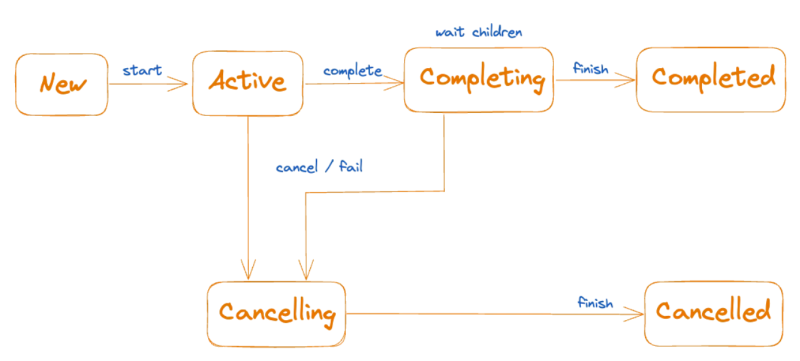Let’s talk about handling errors in coroutines. This is key to building reliable apps. We’ll cover the basics and show you how to deal with problems effectively.
Concept of a “Job” in Kotlin Coroutines
When you start a coroutine with launch or async, you get a Job object. A Job lets you control the coroutine’s lifecycle, including canceling it. Jobs can also be organized in parent-child relationships, so you can manage groups of coroutines together.
Job states

A Job manages a coroutine’s lifecycle and goes through different states. We can’t directly access these states, but we can check properties like isActive, isCompleted, and isCancelled.
- When all of a
Job‘s child coroutines finish,isCompletedbecomes true, andisActiveandisCancelledbecome false. - If a coroutine fails or you call
cancel(), theJobmoves to a “Cancelling” state, and then to a “Cancelled” state. In the “Cancelled” state,isCompletedandisCancelledare true, andisActiveis false.
What happens when an exception occurs in a job?
In a parent-child coroutine hierarchy, canceling a parent also cancels all its children. Also, if a child coroutine throws an exception (other than a CancellationException), the parent and all its other children are also canceled.
For example:
runBlocking {
launch {
println("First Job")
}
launch {
delay(2_000)
println("Second Job")
}
delay(1_000)
throw IllegalArgumentException()
}In this example, after one second, the parent coroutine will throw an exception, which immediately cancels all its children, including the second job.
So, what occurs when we encounter an exception other than CancellationException from the children?
runBlocking {
launch {
println("First Job")
throw IllegalArgumentException()
}
launch {
delay(2_000)
println("Second Job")
}
}Here, if firstJob throws an IllegalArgumentException, secondJob will be immediately canceled because the parent job is canceled.
Supervision
SupervisorJob

With a SupervisorJob, if one child fails, it doesn’t cancel the parent or other children. The SupervisorJob doesn’t propagate the exception, so it and the other children can keep running.
runBlocking {
val scope = CoroutineScope(SupervisorJob())
val firstJob = scope.launch {
delay(1_000)
println("firstJob")
throw IllegalArgumentException()
}
val secondJob = scope.launch {
delay(2_000)
println("secondJob")
}
secondJob.join()
println("Is secondJob cancelled: ${secondJob.isCancelled}")
println("Is firstJob is cancelled: ${firstJob.isCancelled}")
}Output:
firstJob
Exception in thread "DefaultDispatcher-worker-2 @coroutine#2" java.lang.IllegalArgumentException
at com.kolsasia.kol.ExampleUnitTest$addition_isCorrect$1$firstJob$1.invokeSuspend(ExampleUnitTest.kt:28)
at kotlin.coroutines.jvm.internal.BaseContinuationImpl.resumeWith(ContinuationImpl.kt:33)
at kotlinx.coroutines.DispatchedTask.run(DispatchedTask.kt:106)
at kotlinx.coroutines.scheduling.CoroutineScheduler.runSafely(CoroutineScheduler.kt:570)
at kotlinx.coroutines.scheduling.CoroutineScheduler$Worker.executeTask(CoroutineScheduler.kt:750)
at kotlinx.coroutines.scheduling.CoroutineScheduler$Worker.runWorker(CoroutineScheduler.kt:677)
at kotlinx.coroutines.scheduling.CoroutineScheduler$Worker.run(CoroutineScheduler.kt:664)
Suppressed: kotlinx.coroutines.DiagnosticCoroutineContextException: [CoroutineId(2), "coroutine#2":StandaloneCoroutine{Cancelling}@34c9acd3, Dispatchers.Default]
secondJob
Is secondJob cancelled: false
Is firstJob is cancelled: trueHere, we’re using a SupervisorJob for our CoroutineScope. After one second, firstJob will throw an exception and be canceled, but this exception won’t be passed up to the SupervisorJob. So, secondJob will complete normally without being canceled.
Let see another example
runBlocking {
val firstJob = launch (SupervisorJob()) {
delay(1_000)
println("firstJob")
throw IllegalArgumentException()
}
val secondJob = launch {
delay(2_000)
println("secondJob")
}
secondJob.join()
println("Is secondJob cancelled: ${secondJob.isCancelled}")
println("Is firstJob is cancelled: ${firstJob.isCancelled}")
}The result is the same as the previous example. Because firstJob uses a SupervisorJob, its failure doesn’t affect the parent or secondJob.
SupervisorScope
You can also create a scope with supervisorScope. This builder creates a CoroutineScope with a SupervisorJob. Unlike coroutineScope (which uses a regular Job), if a child coroutine fails within a supervisorScope, it won’t affect the other children or the scope itself.
For example:
runBlocking {
supervisorScope {
val firstJob = launch {
delay(1_000)
println("firstJob")
throw IllegalArgumentException()
}
val secondJob = launch {
delay(2_000)
println("secondJob")
}
secondJob.join()
println("Is secondJob cancelled: ${secondJob.isCancelled}")
println("Is firstJob is cancelled: ${firstJob.isCancelled}")
}
}The output
firstJob
Exception in thread "Test worker @coroutine#2" java.lang.IllegalArgumentException
secondJob
Is secondJob cancelled: false
Is firstJob is cancelled: trueException handling strategies
When using “launch”
On the launch , exceptions will be thrown directly so you just use try/catch inside of the block:
runBlocking {
val firstJob = launch {
try {
delay(1_000)
println("firstJob")
throw IllegalArgumentException()
} catch (e: Exception) {
println("Exception caught: $e")
}
}
firstJob.join()
println("Is firstJob cancelled: ${firstJob.isCancelled}")
}Output:
firstJob
Exception caught: java.lang.IllegalArgumentException
Is firstJob cancelled: falseAlso you can use the CoroutineExceptionHandler which is similar to Thread.uncaughtExceptionHandler.
val exceptionHandler = CoroutineExceptionHandler {_, exception ->
println("CoroutineExceptionHandler caught $exception")
}
runBlocking {
val scope = CoroutineScope(exceptionHandler)
val firstJob = scope.launch {
delay(1_000)
println("firstJob")
throw IllegalArgumentException()
}
firstJob.join()
println("Is firstJob cancelled: ${firstJob.isCancelled}")
}Output:
firstJob
CoroutineExceptionHandler caught java.lang.IllegalArgumentException
Is firstJob cancelled: trueHere, the CoroutineExceptionHandler will catch any uncaught exceptions. Unlike the previous example, the first job is canceled in this case, so firstJob.isCancelled will be true.
When using “async”
On the async, exceptions will not be thrown until getting the result by calling the Deferred.await() . You can use try/catch while getting result:
runBlocking {
val scope = CoroutineScope(Dispatchers.Default)
val deferred = scope.async {
println("firstJob")
throw IllegalArgumentException()
}
try {
deferred.await()
} catch (e: Exception) {
println("Exception caught $e")
}
}Output:
firstJob
Exception caught java.lang.IllegalArgumentExceptionCoroutineExceptionHandler
CoroutineExceptionHandler is a last-resort mechanism for global “catch all” behavior. You cannot recover from the exception in the CoroutineExceptionHandler. The coroutine had already completed with the corresponding exception when the handler is called. Normally, the handler is used to log the exception, show some kind of error message, terminate, and/or restart the application.
It’s important to know that async always catches exceptions and stores them in the Deferred object. Using a CoroutineExceptionHandler with async has no effect.
For example:
runBlocking {
val scope = CoroutineScope(exceptionHandler)
val firstJob = scope.async {
println("firstJob")
throw IllegalArgumentException()
}
firstJob.await()
}In this case, CoroutineExceptionHandler remains ineffective and also exception won’t be propagated until we invoke Deferred.await() .
Conclusion
This article showed you the basics of handling coroutine exceptions:
- Use
try/catchfor simple, local error handling. - Use a
CoroutineExceptionHandleron the parent coroutine for centralized exception handling. - Use
SupervisorJobandsupervisorScopeto prevent sibling coroutines from being canceled due to a failure in one of them.
We hope this helps!

Leave a Reply